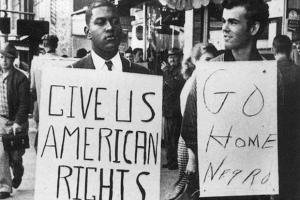Trump Pick for Top Civil Rights Enforcer Has Made a Career of Fighting Discrimination Claims
Mother Jones
 During the election Donald Trump made his pitch to black and Latino voters: “What do you have to lose?” Six months into his presidency, Trump is giving a very clear answer: quite a lot, actually. During the campaign Trump was clear about his commitments to rolling back racial justice and civil rights gains, fashioning his campaign on a “tough on crime” and “law and order” platform that many racial minorities recognized as a dog whistle for racist policies.
During the election Donald Trump made his pitch to black and Latino voters: “What do you have to lose?” Six months into his presidency, Trump is giving a very clear answer: quite a lot, actually. During the campaign Trump was clear about his commitments to rolling back racial justice and civil rights gains, fashioning his campaign on a “tough on crime” and “law and order” platform that many racial minorities recognized as a dog whistle for racist policies.
 “Guerrilla” is a who’s who of 1970s radical movements, and by Episode 2 a flow chart is required to keep up with the revolutionary networks at play: The Weather Underground. Black Panthers. German Marxist-Leninists. Rhodesian revolutionaries. The Front de libération du Québec (yes, even Canada was radical in those days).
“Guerrilla” is a who’s who of 1970s radical movements, and by Episode 2 a flow chart is required to keep up with the revolutionary networks at play: The Weather Underground. Black Panthers. German Marxist-Leninists. Rhodesian revolutionaries. The Front de libération du Québec (yes, even Canada was radical in those days).
The largely unknown and pivotal role played by Black landowning families in the deep South who controlled over a million acres in the 1960s. Available through California Newsreel.
 Jon Else, was the series producer and cinematographer for the classic TV documentary on the civil rights movement, Eyes on the Prize. His new book, whose new book, True South, is a moving look at the civil rights movement through one man's life, frames our present grim moment in the context of that remarkable history. It's a past worth remembering as the protest movement of the twenty-first century finds its way in a grim world.
Jon Else, was the series producer and cinematographer for the classic TV documentary on the civil rights movement, Eyes on the Prize. His new book, whose new book, True South, is a moving look at the civil rights movement through one man's life, frames our present grim moment in the context of that remarkable history. It's a past worth remembering as the protest movement of the twenty-first century finds its way in a grim world.
 The new labor liberalism, built with the support of proportionally more non-white workers (and women), is more progressive than the old pre–civil rights era labor liberalism. If it achieves its powerful new vision, it will be a more humane, cosmopolitan, and egalitarian movement than its predecessor. But as of now, it is a significantly smaller movement and lacks economic and political leverage in key sectors of the political economy.
The new labor liberalism, built with the support of proportionally more non-white workers (and women), is more progressive than the old pre–civil rights era labor liberalism. If it achieves its powerful new vision, it will be a more humane, cosmopolitan, and egalitarian movement than its predecessor. But as of now, it is a significantly smaller movement and lacks economic and political leverage in key sectors of the political economy.
Spread the word